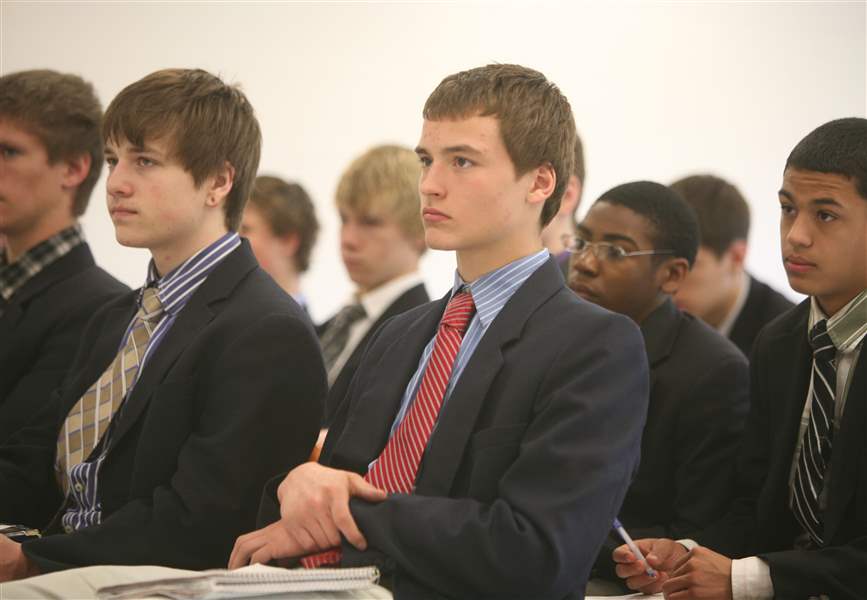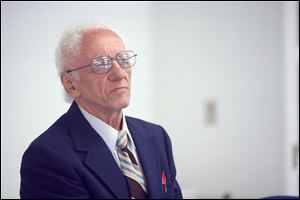
St. Francis students' eyes opened to horror of Holocaust
5/3/2010
Sophomore Matt Haupricht, center, is among the St. Francis de Sales High School students listening to Mitchell Garwolinski's recollections of atrocities suffered at Nazi hands.
The Blade/Lisa Dutton
Buy This Image

Garwolinski
Imagine watching soldiers from an occupying army murder an infant and its mother, machine-gun civilians into mass graves, and beat your parents on different occasions before arresting them - not to mention being arrested yourself, imprisoned in labor camps, shot at, and tortured at various times.
And imagine all of this and other horrors occurring before your 13th birthday.
After hearing Mitchell Garwolinski's stories of Nazi atrocities in Poland during World War II - atrocities that reached a personal nadir when Mr. Garwolinski became a lab rat for medical experiments at the Treblinka concentration camp - Matt Haupricht of West Toledo, a sophomore at St. Francis de Sales High School, conceded he could not imagine himself that way.
"It made him grow up really fast," Matt said last week after he and about 25 classmates in a U.S. history class heard Mr. Garwolinski tell his tale. "It's unbelievable having to experience that."
"Just the severity of it" was what struck Ryan Snyder of Oregon about the ordeal that Mr. Garwolinski described during the six years Nazi Germany occupied Poland, slowly starving the local populations to death and reserving especially horrific treatment for families like his that were found to have assisted Jews.

Sophomore Matt Haupricht, center, is among the St. Francis de Sales High School students listening to Mitchell Garwolinski's recollections of atrocities suffered at Nazi hands.
It didn't matter at all that Mr. Garwolinski and his father were American citizens - his father was a U.S. government agent - when the Nazi blitzkrieg overran Poland in September, 1939. They were stuck there, and the German secret police eventually came to know that the elder Mr. Garwolinski had provided shelter for some Jewish friends in a bunker behind their home in the village of Baronowo.
Young Mitch got on the local Gestapo commandant's bad side when his father escaped from a labor camp. The commandant whipped and tortured him in hopes of eliciting information about the father's whereabouts, and when that failed, the boy was dispatched to a "school" where young children were to be indoctrinated into the Nazi belief system in between sessions of hard labor.
But he was not interested in becoming an obedient Nazi, and when the opportunity to flee arose, he took it. This would only worsen the treatment he received, of course, when he was recaptured and sent to two work camps, and then, again, to Treblinka.
His intervals of freedom were only marginally better. Young Mitch found himself having to beg for or steal food just so he and his family would not starve to death in the cold Polish winters, risking summary execution if he were caught.
During the forced marches at the work camps, those who fell behind were shot. Mr. Garwolinski avoided this fate once because when he collapsed by a roadside, other marchers covered him with straw and guards didn't notice his absence until the next day. A passer-by rescued him before he died of exposure.
His escape from a second work camp occurred only because, during a particularly savage beating by one of the guards, the boy found a sharp stick beneath him on the ground and jammed it into one of his torturer's eyes, then ran. But Mitch was recaptured the next day, and that was when he was sent to Treblinka.
There, he was injected with or exposed to various drugs and diseases for supposed experiments for several months until one morning when a guard slashed the sole of one of his feet, intending that he bleed to death while bound to his bed. But that was the day that resistance and Soviet Russian forces attacked the "hospital." A friendly nurse helped Mr. Garwolinski escape into the woods - although the nurse was shot to death while doing so.
With this anecdote, Mr. Garwolinski concluded his presentation to the students with a report that his family finally made it to the United States in 1947. He would go on to serve with the U.S. Army during the Korean War, during which he was shot, and he later settled in Toledo.
A book he wrote in 2004, Silent Screams of a Survivor: A Polish-American Boy's Holocaust, made it clear that there was more horror to come in Europe, not the least of which was the civil conflict that would develop in Poland after the Russian Communists forced the Germans out.
Perhaps most troubling to Mr. Garwolinski, he found himself on a lonely road one day, having just picked up an abandoned German weapon, as the Soviet army advanced on Baronowo. He came upon a man and two children in a foxhole, and after a few moments the man abruptly raised a rifle and pointed it toward him.
As the man shot, Mitch also opened fire, killing the man and the two children. As it turned out, the man had shot and killed a German soldier who had appeared behind Mitch and was about to shoot him. Without realizing it, 12-year-old Mitch unwittingly killed a man who had, an instant before, saved his life.
In response to a question from young Haupricht, Mr. Garwolinski said it was devotion "to God and my family" that kept him going, although in the book he recounts occasions of doubt that a just God could allow him to suffer as much as he had.
Mr. Garwolinski told the St. Francis class that he wrote the book, available locally for $15.95 at Bassett's Health Foods stores, at the advice of a psychiatrist, who said putting his memories on paper would help him cope with them.
"I do get flashes in the daytime, and nightmares," he said.
But Mr. Garwolinski, now 77, said he continues revisiting his story with area schoolchildren because he doesn't want it to be forgotten.
"This was the greatest evil ever known," he said, displaying a copy of a $15,000 reparations check he eventually received from the German government as proof against Holocaust deniers. "I don't want it to ever happen again."
Ryan Snyder pledged to do his best to perpetuate the memories.
"If I could spread this through my generation, it's an opportunity to prevent the same sort of hatred" from rising again, he said.
- David Patch